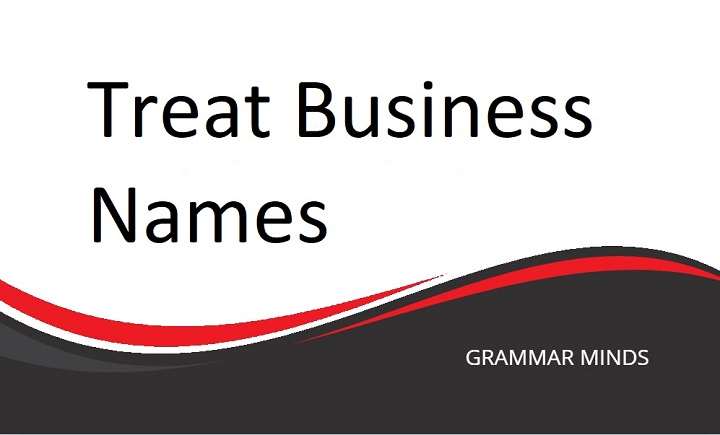A business name is more than just a label; it’s the foundation of your brand identity and a critical asset in marketing your product or service. The right business name can convey your company’s values, attract your target audience, and create a lasting impression. But how do you choose the perfect business name? In this article, we’ll explore what makes a great business name, how to come up with one, and some key strategies to ensure your name resonates with your audience and sets you up for success.
The Importance of a Strong Business Name
Choosing a name for your business is not something to be taken lightly. Your business name will be one of the first things potential customers or clients see or hear. It will influence how they perceive your brand and may determine whether they engage with you further. Below are some of the reasons why a strong business name is essential:
- Brand Identity: Your business name plays a huge role in defining who you are as a company. It sets the tone for your brand’s personality and values.
- Memorability: A well-crafted name is easy to remember, helping your business stay top-of-mind for customers.
- First Impressions: A catchy, meaningful name can grab attention quickly and pique interest.
- Searchability and Online Presence: With the internet being the go-to for most consumers, your business name can affect your search engine optimization (SEO) efforts.
- Legal Protection: A unique business name is crucial for trademarking and protecting your intellectual property.
Let’s dive into how you can come up with a name that fits all these criteria.
Characteristics of a Great Business Name
Before brainstorming names, it’s helpful to know what makes a business name effective. While every brand is unique, there are some universal qualities that great business names tend to share:
- Simplicity: Avoid overly complicated names. The easier it is to spell, pronounce, and remember, the more effective it will be.
- Relevance: Your name should reflect what your business does or what it stands for. It doesn’t have to be literal but should be connected to your industry or values.
- Uniqueness: You want a name that stands out from the competition. If your name is too generic, it will blend into the background.
- Scalability: Think about the future of your business. Will your name still be relevant if you expand into new products or markets?
- Positive Connotations: The name should evoke positive emotions and associations. Avoid names that could be misinterpreted or have negative connotations in different languages or cultures.
- Domain Availability: In the digital age, having a corresponding website domain name is critical. Before settling on a name, make sure the domain is available.
Brainstorming Techniques for Business Names
The process of coming up with a business name can be both fun and challenging. Here are some brainstorming techniques to help you generate ideas:
Mind Mapping
Start by writing down words that are related to your business, industry, and values. From there, draw connections between ideas and look for creative ways to combine them. Mind mapping can help you think outside the box and explore a variety of possibilities.
Word Blending
Blending two or more words together is a popular technique for creating unique business names. Consider words related to your business and try combining them into one. For example, “Snapchat” is a blend of “snap” and “chat.” This can lead to distinctive and memorable names.
Acronyms and Initials
Using acronyms or initials of longer phrases related to your business can create a clean and professional name. Just be sure the acronym doesn’t spell anything awkward or negative.
Play on Words
A clever play on words can make a name more engaging and memorable. Puns, alliteration, and rhymes can all be effective when done correctly.
Use Foreign Words
Sometimes, using a word from another language can add intrigue to your business name. Just ensure that it is easy to pronounce and has a positive meaning in that language.
Incorporate Values and Mission
Think about your company’s core values and mission. Is there a word or concept that embodies what your business stands for? Names that evoke your purpose can resonate strongly with your audience.
Use Name Generators
If you’re feeling stuck, business name generators can offer inspiration. Tools like Shopify’s Business Name Generator or Namelix can help you explore different options based on keywords.
Testing Your Business Name
Once you’ve brainstormed a few potential names, it’s important to test them out. Here’s how you can evaluate your options before making a final decision:
Ask for Feedback
Get feedback from your target audience, friends, family, and even industry professionals. Ask questions like:
- Is the name easy to remember?
- Does it accurately represent the business?
- What emotions or thoughts come to mind when you hear the name?
Check for Availability
After narrowing down your list, check the availability of each name. This includes:
- Domain Names: Ensure that the domain name is available for your website. Use tools like GoDaddy or Namecheap to check domain availability.
- Social Media Handles: Verify that your preferred name is available across key social media platforms.
- Trademark Search: Conduct a trademark search to ensure the name isn’t already registered or protected in your industry.
Phonetic and Visual Appeal
Your business name should sound appealing when spoken aloud, and it should look good visually. Consider how the name will look on your website, business cards, signage, and marketing materials. Simplicity and clarity are key.
Also Read
Synonyms for “Let Me Know”: A Comprehensive Guide to Diversifying Your Communication
Legal Considerations
Before you finalize your business name, it’s crucial to handle the legal aspects. Here are some steps you’ll need to take:
Trademark Registration
If you want exclusive rights to your business name, you should consider trademarking it. This will protect you from others using your name and give you legal recourse if someone tries to copy it. You can file for a trademark through your country’s trademark office, such as the United States Patent and Trademark Office (USPTO).
Business Name Registration
Registering your business name with local and state authorities is usually required when forming a legal business entity, such as an LLC or corporation. This ensures that no other business in your region can operate under the same name.
Check for Domain Squatters
Some people purchase domain names they have no intention of using in hopes of reselling them at a high price. If your desired domain is taken but inactive, you may have the option to negotiate with the domain owner or file a claim for domain squatting.
Common Mistakes to Avoid When Choosing a Business Name
Choosing a business name comes with its share of challenges, and it’s easy to make mistakes in the process. Here are some common pitfalls to watch out for:
Overcomplicating the Name
Trying too hard to be clever can backfire. Avoid names that are difficult to pronounce, spell, or understand. Simplicity is often the best approach.
Being Too Literal
While it’s important for your name to reflect your business, don’t limit yourself by being too literal. Names like “Tech Solutions Inc.” or “Best Coffee Shop” are generic and don’t stand out.
Ignoring Future Growth
Consider where your business might be in 5 or 10 years. Will your name still be relevant if you expand into new markets or offer new products? A narrow name could limit your growth potential.
Neglecting the Audience
Your business name should resonate with your target audience. A name that appeals to you might not appeal to the people you’re trying to attract. Always prioritize your customers’ preferences and perceptions.
Forgetting the Legal Aspects
Failing to check for trademarks or domain availability can lead to legal issues down the road. Always ensure your name is legally clear before you start using it.
Your business name is the cornerstone of your brand, and getting it right is crucial for long-term success. The best business names are simple, memorable, and aligned with your company’s values and future vision. Take the time to brainstorm, test, and secure your name legally to ensure it sets you up for success.
Choosing a business name may seem daunting, but with the right approach and strategies, you can find a name that resonates with your audience and helps your business grow. Start your journey today, and treat your business name with the importance it deserves.







